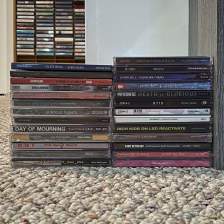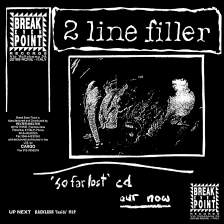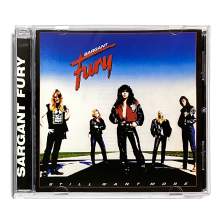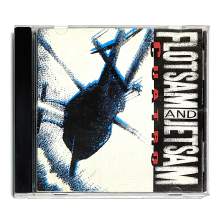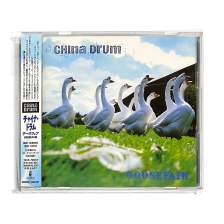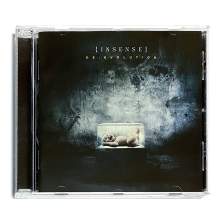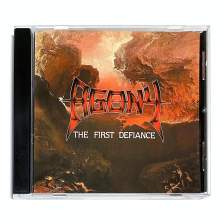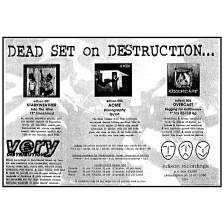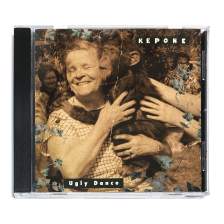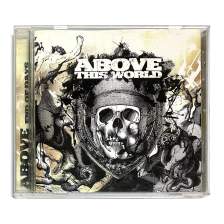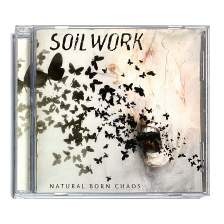A succinct introduction: Brooklyn's Chain Gang Grave is an unusual band made up of Young Al Bundy (vocals), Andrew Lanza (guitar), Josh Poveda (bass), and Jason Bennett (drums). They've been called "post-punk," "noise pop," and "chaos punk." My ears also caught vague traces of black metal, Godflesh, and Sabbath-cultivated doom. Accurate? Laughably off base? It's likely that no two opinions will see eye to eye. So, let's let the band speak for themselves...
I know it's not quite on topic, but since Andrew and Jason were both previously in And This Army, I'd like to open on that. That band flew pretty far under the radar, and kind of faded away in the end. The second album, Foe, seemed to get around, but the final EP, The Skin of Teeth, is almost completely unheard of. Can you point to anything in particular that confined And This Army to such obscurity?
Andrew: I think it was just a combination of the fact that the music was a little off-kilter and the lack of any real support network. As far as the music was concerned, the sung vocals seemed to rub some people the wrong way—almost as if they were out of place in that kind of music. We've never been adept at networking or schmoozing, so opportunities to get our name out there were few and far between.
After the dissolution of And This Army, what were the two of you doing in the interim, and what brought you back together for Chain Gang Grave?
Andrew: I had stopped playing music altogether and went back to school. Jason worked on growing his videography business. At some point in 2010, we started jamming again—almost out of compulsion. At that point there was no intent to start a new band or anything, it was simply to have fun and space out. The bass was getting a little boring to play on its own, so on a whim I picked up a friend's guitar and songs just started coming together. We would just improvise for hours and write music over the next few months, and decided to attempt another band.
And This Army and Chain Gang Grave are very different entities, but they share the connection of exploring dark, atypical music that avoids being pinned down to generic genres. Is that an organic outcome of your collaborations together, or something that you make an effort to carry over in your work?
Andrew: It just sort of naturally works itself out that way, first and foremost. Jason and I have been playing together for so long that we developed our own style. Alan [Young Al Bundy, vocals] comes from his own place that—like Brendan of And This Army—is atypical. That being said, there is also a conscious effort to avoid being generic. If we start playing something that is a little too obvious or sounds like a particular band, we almost always scrap it.
SEE ALSO: Review: Chain Gang Grave, When Your Friends Become Cops (Self-Released, 2014)
Previously, Andrew and I have briefly discussed the fact that your song structures are constantly on the move and don't really employ repetition. How does that take shape from a songwriting perspective?
Andrew: The songs are almost always taken from improvisation sessions. A lot of times we'll take the structure straight from the jams and just adjust the amount of repetition, perfect the riffs and drum patterns, etc. On Bury Them and Keep Quiet, we tried our hand at slightly more traditional structures as a challenge, though the raw material for the songs still originated from improvisation.
Jason: The common thread throughout our bands is that our music is always derived from free-form jams. We don't think about what kind of music we are going to play, we just go with what comes out of us and edit it down into songs. What also keeps our creativity fresh is that the band members all bring in very different influences. What gets them to blend organically is really the jamming. That keeps us away from the choppy and compartmentalized Mr. Bungle approach.

So, in terms of musical backgrounds and listening habits, it's a mixed bag from person to person?
Andrew: Total mixed bag. Although Jason and I are into a lot of the same stuff and trade music suggestions at the same rate we did in high school, our tastes can be pretty divergent. The guy just has incredibly diverse tastes as far as genres go; whereas I prefer to go deep into old metal, hardcore, punk, and rock 'n' roll mostly.
Alan doesn't listen to a lot of the bands we're into, and vice-versa. His experience with the metal realm is limited, but he has a very deep sense of history with punk and hardcore. He's also into rap, where we are not. Josh also has his own unique set of tastes—ranging from classic metal, rock, and hardcore, to electronic stuff and weird current music that I have no clue about.
As you fleshed out the band's lineup, how did you hook up with people like Alan and Josh whose musical interests are somewhat outside your own?
Andrew: We found Alan through Craigslist. We identified a few common points of interest like Rites of Spring and Black Flag and decided to take a shot. He may have unwittingly seen And This Army open for a popular local punk band in our early days in Coney Island, so that was a sort of interesting coincidence.
Josh we met through playing a show with the Frank's Basement crew at a synagogue back in 2014. He was playing guitar in a really cool noise rock band, and we ended up hitting it off and keeping in touch. When the time came to add a bass player, he was on the short list of people to bug.
Just for fun, what are three albums that have influenced your musicianship on an individual, personal level that no fan of Chain Gang Grave would likely ever suspect?
Josh:
- Frank Zappa, Make a Jazz Noise Here
- Fripp & Eno, Evening Star
- Ornette Coleman, Science Fiction
Andrew:
- Dark Quarterer, Dark Quarterer
- Death Side, Wasted Dream
- Mark Hollis, Mark Hollis
Jason:
- John Coltrane, A Love Supreme
- Tom Waits, Rain Dogs
- Benny Goodman (featuring Gene Krupa), The Famous 1938 Carnegie Hall Jazz Concert
Alan:
- The Nation of Ulysses, Plays Pretty for Baby
- Ceremony, Still Nothing Moves You
- mewithoutYou, [A→B] Life
The material on the new EP, Bury Them and Keep Quiet, is a little shorter, faster, and arguably more "straightforward," for lack of a better term. There are elements that have more of a tangible hardcore/punk energy—though, again, I would certainly not classify the band as such. How and/or why would you say the writing has evolved from When Your Friends Become Cops?
Andrew: We just became more comfortable writing with a little more repetition and slightly more traditional structures. As I said before, it was initially a challenge for us, because we're used to hijacking the best bits of our jams wholesale, refining the parts, and just giving it to Alan for the vocal treatment. This time the riffing and drum patterns just lent themselves to being put into a more tightly wound construct. There was also more collaboration with Alan, and added attention to how the vocals fit into the songs. In my opinion, he gelled with the music this time out in a way that surpasses When Your Friends Become Cops.
You've also since added bassist Josh Poveda to the lineup. What made that the right call in the end?
Andrew: We had wanted to add a bass player for a long time, if only to thicken up our live sound. I played bass on the record (with the exception of "Aviary"), and had the intention of finding someone to simply play those parts live. When we started playing with Josh, though, it became clear that he was not only a very capable musician, but that he knew how to write a bassline without stepping on the songs' toes. I ceded my extremely guarded bass role only because I have faith in Josh's ability to do right by the songs.
What bits and pieces I can decipher of the lyrics seem really interesting. It seems to me that they're an important component of the overall aesthetic of the band, so I'm curious why they're not included on Bandcamp or in physical copies of the cassettes, etc.?
Alan: For our first release, the lyrics weren't included anywhere. But for this one, if you buy the tape the lyrics are printed on the insert. It's all printed on one page, so the letters are tiny. You might even need a magnifying glass to make them out. I like the idea of making people put in a little work to make sense of our songs. It forces the listener to pay closer attention.
If you'd be willing, how would you describe or elaborate upon the lyrical content or approach?
Alan: I start with little scraps of ideas that speak to me. Imagery from books or excerpts from poems that I find interesting. Drunken stream of consciousness writings, recovered the next morning. Dreams, memories, and turns of phrase. I piece these together and flesh them out and try to make them fit. It's tough writing for Chain Gang Grave because the instrumentals are so strange and irregular. But I think once I put words to the music, it helps clarify the underlying structure and makes them songs in a more traditional sense. It's very rewarding when it all comes together.
Jason, you've handled all of the band's recordings to date in your basement. What are the benefits of having that setup at your disposal?
Jason: It's convenient for a lot of reasons. The most important is that we aren't under pressure to record an entire album in two days, because that's all we can usually afford. Building our own studio was a better investment. Microphones last forever—we don't use any other gear besides a ProFire 2626 interface and a laptop. Our setup is super affordable, and we already got two records and many demos out of it. Also, we like recording the base tracks (guitar and drums) live in order to maintain a live feel. You just cannot get into the zone to get a good live performance unless you're in a comfortable environment. For us, that's in our basement—where we've been writing and rehearsing for half of the 17 years that Andrew and I have been playing together.
What's your attraction to the cassette format? Is it nostalgia at all? Is it the economic reality that they're simply far cheaper and faster to produce than other formats in the current climate?
Andrew: Ideally, we would press all of our stuff on vinyl. It's just very expensive and there's too much of a wait time. Being without a label really limits what formats we can and can't do feasibly. CDs are a waste as nobody buys them anymore. In the end, though, the music is most often listened to digitally, so the physical copies are for the people who really want it. Cassettes are the perfect compromise, especially if they're well done. We put a lot of effort into the layout this time, and we think cassetteheads and Chain Gang Grave fans will really be into it.
I'm sure it's somewhat of a slow burn, but it seems like Chain Gang Grave is getting some decent coverage out and about. Does it feel like you might actually break free from the aforementioned confines of obscurity this go-round?
Andrew: Only time will tell. Things seem to be pointing in that direction, but getting our hopes up in that respect can be dangerous. That said: breaking out of obscurity would be fucking incredible.
***
Bury Them and Keep Quiet will be available on cassette and digitally on November 13th, but you can pre-order now. The second pressing of When Your Friends Become Cops is still available on cassette in very limited quantity.

